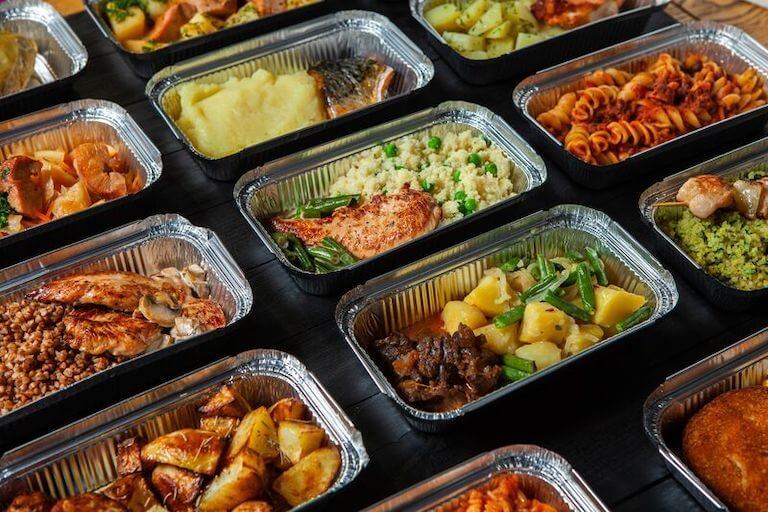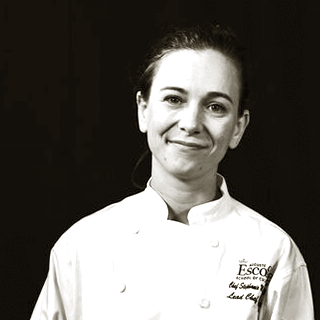Listen to This Article:
How can someone identify the “top careers in food?” What criteria is this based on? After all, one person’s dream job could be a hard “no thanks” to someone else!
Since all jobs can’t be painted with the same brush, here are 13 great careers in the food industry–and who may want to consider them.
1. Executive Chef: If You Want To Run the Show
The executive chef is ultimately in charge of the kitchen. This person may create the menu and recipes, manage costs, set pricing, track inventory, and be responsible for staffing (which includes hiring, firing, and training). The rest of the cooks and chefs all look to the executive chef for direction and guidance, day in and day out. That’s a lot of responsibility!
The people who thrive as executive chefs are comfortable being in charge and don’t get frazzled when they have to make tough decisions. It can be a difficult job, but a rewarding one, too.
Becoming an executive chef usually can take several years and quite a bit of education and expertise. Some chefs attend culinary school and build on that foundational learning through work experience, practice, and self-study.
Get Advice from Top Executive Chefs on The Ultimate Dish Podcast
2. Recipe Developer: If You Love Piecing a Puzzle Together
Home cooks and restaurant cooks both tend to work from recipes. But where do the recipes come from?
They come from recipe developers who create recipes for restaurants, cookbooks, television shows, and magazines. They may work alongside chefs, or they may be responsible for the recipe on their own, depending on the application.
A recipe developer has to create the right balance of ingredients and textures, but they also have to explain it step-by-step, in clear language. To do this, education is paramount. Without it, how could you know the right cook times, internal temperatures, flavor profiles, and seasoning techniques? And it’s not just a matter of taste—it can be a matter of safety too. Poor recipes could lead to undercooked chicken, cross-contamination, or other hazards for diners.
Not all recipe developers have commercial kitchen experience, but it can help—especially if you plan to create recipes for restaurant use. That work experience can help the recipe developer to understand what is possible and the best workflows for a busy kitchen. It’s very different from cooking at home!

Creating recipes takes creativity and plenty of background knowledge.
3. Personal Chef: If You Want to Work Independently and Manage Your Own Schedule
The entrepreneurial personal chef has more control over their work life than many other culinarians. Personal chefs batch pre-made meals that their clients can then heat and eat. The clients get the convenience of homemade meals without meal planning, grocery shopping, prep, or cooking!
While some personal chefs work for larger companies, many others work entirely independently. This means the personal chef can manage their own hours and create their own recipes! Of course, that also means that it could be hard to take time off, as clients are still expecting their meals. But for many, the autonomy is worth it. While no particular education is required to be a personal chef, it may be easier to get clients with a culinary or food entrepreneurship degree or diploma!
4. Food Stylist: If You Like Working Behind the Scenes and Have a Great Eye for Aesthetics
A food stylist is responsible for making dishes or spreads look just right. They often work behind the scenes on television and film sets, magazine photo shoots, and commercial marketing shoots. They may work with food photographers or with a film’s set designers and prop masters to perfect the look of each plate.
And on a film or television set, if the talent has to eat the food, they have to come prepared! They may have to re-set that plate of pasta each time they try a new take. And that means making the same dish over and over.
Some food stylists even get to work with celebrities. Escoffier graduate and food stylist Lisa Spychala has worked with celebrity chefs like Anne Burrell and Carla Hall. She even got to make a commercial with Freddie Prinze, Jr.!
There are many tricks of the trade that a food stylist can begin to learn as an intern or assistant. But a culinary education can also be invaluable in making the food more than a showpiece. It has to taste good if that famous actor is going to take a bite! And it has to stay safe.
5. Pitmaster: If You Like To Take Your Time (and Don’t Mind Late Nights!)
You plan to serve wonderful barbecue fare starting at noon each day. But it takes 18 hours to smoke your briskets. Basic math says you’re going to be in for some late nights.
Pitmasters are meat experts. They cook their proteins low and slow to break down the connective tissue and create impossibly tender ribs, briskets, pulled pork, and more. It’s a labor of love, careful attention to detail, and time.
So if you prefer the act of slow-smoking, rather than the fast pace of a restaurant kitchen, working as a pitmaster could be perfect for you!
Consistency is key for the pitmaster, which takes plenty of practice. Some pitmasters get a foundational education in culinary school, where they can explore food safety and sanitation, practice their knife skills, and discover world cuisines (which may influence their approach to barbecue). After that, it’s all about putting in the hours at the grill or smoker. Some start out as amateurs, but you may build better habits by working under an experienced pitmaster.
6. Chocolatier: If You Think Chocolate Should Be Its Own Food Group
Chocolatiers are dessert professionals who specialize in—what else?—chocolate. They know where the best cacao beans come from and the perfect proportions of cacao, sugar, and milk. They make chocolate truffles, chocolate bars, bonbons, chocolate-covered fruits and nuts, and more. Some make elaborate chocolate sculptures as showpieces for events using advanced tempering and molding techniques.
For a chocolate-lover, it sounds like a dream! Chocolatiers may work in a large-scale commercial capacity, or they may work in a boutique chocolate shop or pastry shop.
To learn the basics of working with chocolate, many chocolatiers attend pastry school. Others may get their education as apprentices to a chocolate maker.
Get Inspired by Chocolatier Katrina Markoff
- Listen to luxury chocolate maker Katrina Markoff as she shares her fascinating story with Escoffier on The Ultimate Dish podcast!
7. Chef Consultant: If You Want a New Challenge Every Day
Most jobs—even the ones you love—can get a little tedious year after year. So, if you want something that stays fresh and offers new challenges, consider becoming a chef consultant!
Chef consultants work on specific projects or goals for foodservice businesses and food producers. They may help a restaurant to create new training materials and programs, or look for efficiencies in their current operations. They may help a food manufacturer to develop a new product and bring it to market. They may also become specialized in a specific area, like Hazard Analysis Critical Control Point programs (HACCP) or cost-cutting measures.
The variability of this role can keep things interesting for the chef consultant for years to come!
Chef consultants must have a high level of expertise, so this is a role that is often best for extremely experienced chefs. A foundation in culinary school is highly recommended, followed by several years of work in the type of environment you’d like to consult in.
Chef Consultants Can Build Their Own Specialties
- Escoffier graduate and Research & Development Chef Consultant Chris McAdams has created his own niche, helping brands to develop their products and work on their marketing. Get inspired by his story on The Ultimate Dish podcast.
8. Pastry Chef: If You Love Sweets and Desserts
If all other food is just an obstacle between you and dessert, you may wish to reach for the career of pastry chef. Pastry chefs work in many of the culinary segments, like restaurants, hotels, bakeries, and pastry shops. In a restaurant, the pastry chef may be responsible for the entire dessert program, including sweet sauces, baked goods, ice creams, and more. And in a bakery setting, the pastry chef could focus more on shelf-stable items like pâtisserie.
The work of a pastry chef combines baking with high-end finish work for beautiful pastries or finished desserts. What better career in food could there be for a sweets fiend?
Pastry chefs often complete a degree or diploma in baking and pastry to learn the basics of their craft. Then they may get jobs in bakeries, pastry shops, or restaurants to continue learning and increasing their skills. Reaching the level of pastry chef can take some time, but it’s awfully tasty along the way.

Pastry chefs must be extremely precise to make their pastries picture-perfect.
9. Ghost Restaurant Owner: If You Want to Be a Food Entrepreneur with a Lower Financial Investment
Starting a restaurant or a food truck can be the dream for some. But these enterprises do come with some significant costs that can make it a daunting proposition for the aspiring entrepreneur.
If you want to get your food out there with a lower financial investment, consider starting a ghost restaurant! Ghost restaurants operate out of commercial kitchen space and create food exclusively for to-go and/or delivery operations. With no storefront and no service staff, they can be a much more affordable way to get started as a food entrepreneur.
And once you’ve built up a loyal customer base, you may be able to “graduate” to a restaurant or food truck (if that appeals to you).
Running a food business can be complex. Entrepreneurs have to pay close attention to their food costs, labor costs, and overhead if they hope to make a profit. Escoffier’s Food Entrepreneurship programs can include coursework in business planning, marketing, and operations to help future business owners build the skills they may need.

Ghost restaurants serve to-go and delivery customers only.
10. Restaurant Manager: If You Love to Make a Plan and See It Through
The restaurant manager is responsible for executing the owner’s vision, which may involve complex strategy and implementation.
Restaurant managers help to guide the rest of the team in creating a cohesive and pleasant restaurant experience for guests. They may be responsible for hiring, firing, training, and day-to-day operations. They may stop by tables to chat with guests throughout the shift, and can help to ease interpersonal conflict among staff.
Without restaurant managers, we wouldn’t have any restaurants!
Most restaurant managers have extensive restaurant experience before they get their first management role. They may start out as hosts or servers, and work their way up. A degree or diploma in Hospitality & Restaurant Operations Management could help some aspiring managers to climb the ladder more quickly!
11. Health Coach: If You Love Helping People Reach Their Wellness Goals
For a career in food at the intersection of wellness and great eating, consider becoming a health coach. Health coaches help their clients to reach their goals, whether that’s better sleep, less stress, or weight loss. To do this, health coaches may make recommendations regarding healthy diet, fitness and physical activity, managing anxiety, and more.
There are many paths to becoming a health coach, but an education in Holistic Nutrition and Wellness is a great place to start. Through coursework in culinary foundations, nutrition, special diets, coaching techniques, and more, graduates may be prepared to get their first jobs working under more experienced health coaches.
Finding Balance with Health Coach Julie Peláez
- Board-Certified holistic health coach Julie Peláez shares her story and her wellness philosophy on The Ultimate Dish podcast!
12. Wedding Cake Designer: If You Want to Make Unique Celebration Showstoppers
In the western world, there are few desserts as iconic as the wedding cake. It’s likely to be the single most expensive dessert the average person will ever buy, and it’s an important part of the wedding reception tradition. Couples put great faith in their cake designers and bakers!

A wedding-cake ready gum paste rose by Escoffier online Baking & Pastry graduate Irma H.
If you want the privilege (and responsibility) of contributing to these happy unions, you may want to become a wedding cake designer. These bakers must combine baking expertise with high-end decorative skills to make a cake that looks as good as it tastes. Expect to work on delicate piping work, basket weaves, hand-made flowers, and creative color effects. As trends change, designers may need to continually add to their toolbox of decorative skills!
To become a wedding cake designer and decorator, a degree or diploma in Baking & Pastry Arts is a smart place to start. With this foundational education in baking sponges, frosting techniques, and decoration, graduates may be ready to get their first job or apprenticeship in a cake bakery where they can continue to learn and practice their craft.

A smooth finish and gum paste flowers like these take practice! Photo and flowers by Escoffier online Baking & Pastry graduate Irma H.
13. Chef Instructor: If You’re Passionate About Passing It On
Some people know that they’re called to be educators. In the culinary world, dedicated chef instructors at high schools, colleges, and culinary schools share that calling with the next generation of cooks and chefs.
Working as a chef instructor can be a fulfilling career. And it typically comes with “normal” work hours, instead of the late nights and long weekends sometimes required by restaurant work!
To become a chef instructor, a chef needs a great deal of education and experience. Some institutions won’t consider hiring anyone without at least an associate’s degree and several years of chef experience. So becoming a chef instructor is often a great “second act” for a cook or chef who is ready for a new phase in their career!
Meet Some of Escoffier’s Chef Instructors on The Ultimate Dish Podcast!
- Farm to Table® Chef Instructor Steve Nalls talks about regenerative agriculture and Three Sisters Farm & Ranch.
- Pastry Arts Chef Instructor Tracy DeWitt shares how much she loves spending one-on-one time with her students.
- Chef Instructor and Certified Executive Chef John Percarpio talks about work-life balance and his impressive career.
Great Careers Start Here!
Do you see yourself in any of the descriptions above? If so, are you ready to take the next steps?
The starting point for all of these careers—in fact, in any career in food—may be an education. Some choose to get their education “on the job” instead of in a formal culinary school program. And that can work! But it can also take a long time to acquire and leave gaps in your knowledge.
Instead of winging it, consider a formal education from Escoffier. Contact our admissions department to learn more about all of our programs and get your top career started right.
TO LEARN MORE ABOUT CAREERS IN FOOD, TRY THESE ARTICLES NEXT:
- Five Alternative Careers Out of Culinary School
- What Culinary Training Do You Need for a Professional Cooking Career
- Are the Culinary Arts a Good Career Choice for You?
*Information may not reflect every student’s experience. Results and outcomes may be based on several factors, such as geographical region or previous experience.



